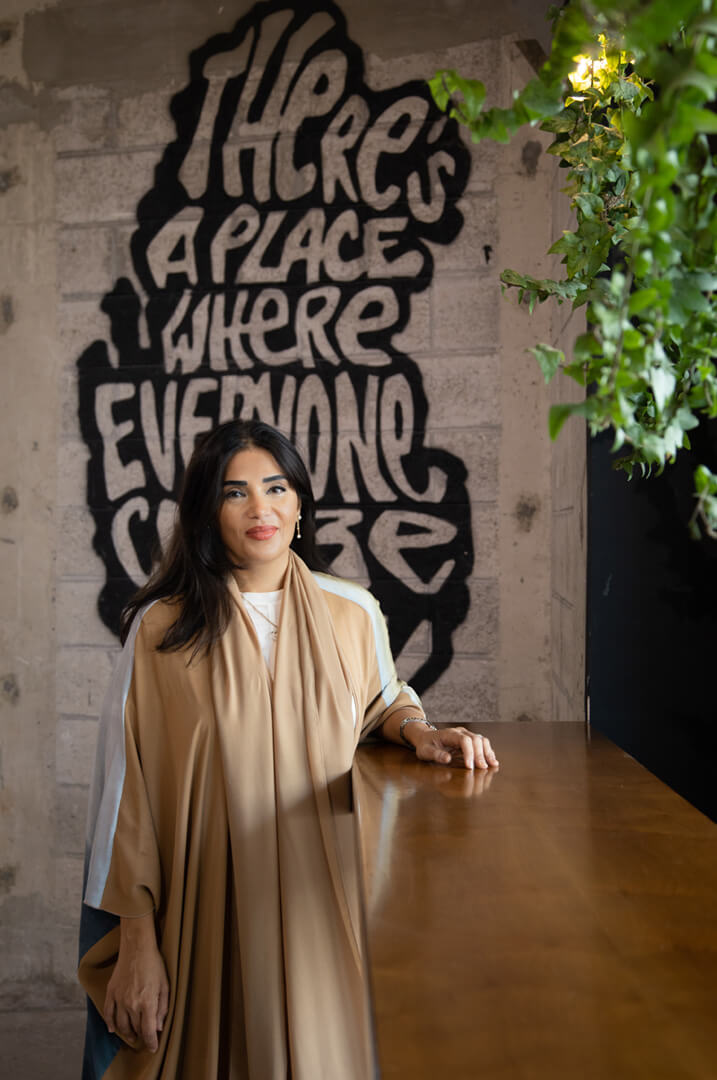Biography
Her Story
Dr Amal Al Malki is a Qatari scholar, educator, public speaker, social commentator and advocate of women’s rights and gender equality. Dr Amal is the Founding Dean of the College of Humanities and Social Sciences at Hamad bin Khalifa University in Qatar Foundation. Prior to that, she was the Executive Director of the Translation and Interpreting Institute, which she founded in 2011.
Dr Al Malki holds a PhD in Comparative Literature from the University of London – SOAS, where she also earned a Master’s degree in English-Arabic Applied Linguistics and Translation. In 2012, Dr Amal published her book titled Arab Women in Arab News: Old Stereotypes and New Media, which was lauded as the first comprehensive study of the topic in the world. Dr. Al-Malki’s research interests include the negotiation of identity between East and West, media representations of Arab women and postcolonial literature.
As Dr Al Malki’s focus is on women’s rights and Arab identity, she strives to help deepen international understanding of Qatar and its evolving place in the world. In 2020, she launched the “Women of the Middle East Podcast” to create a feminist narrative by a Qatari scholar covering women of the middle east and building new areas of knowledge and activism that will enable women to be empowered.

Testimonials
“Dr. Al-Malki grew up an avid reader and writer and dreamed of making Qatar a nation of readers. After working as a journalist and receiving a degree from Qatar University, she studied applied linguists and translation and later post-colonial studies at SOAS. She received her PhD on the post-colonial novel where she explored the decision of post-colonial writers, like Chinua Achebe, to write in English. This work helped sow her recurrent thinking about “hybridity,” the advantages of seeing oneself not only part of multiple language systems but also multiple cultures
and identities. As part of her post-doctoral studies, she was a scholar in residence with me at Carnegie Mellon/Pittsburgh where she attended my seminar in English Writing and Representational Theory.
Dr. Al-Malki quickly mastered the lectures both as a student and a teacher and began to co-teach with me. She saw immediately how the principles under discussion would appeal to the Arab student writing in English or Arabic.
Based on her post-doctoral experience, Dr. Al-Malki was appointed Assistant Professor of English at Carnegie Mellon/Qatar, where she became the first, and still only, Qatari national to hold a faculty appointment in any of the American or British universities in Education City. She adapted my lectures for her course, The Writer’s Craft, which was among the highest rated courses in Education City. Dr. Al-Malki published books on the course featuring her students’ writing in both English and Arabic. She also published extensively with me in American and British refereed journals.
Having been a student in London during 9/11, Dr. Al-Malki experienced firsthand the challenges of Arab stereotyping in western countries. Having trained as a post-colonialist, Dr. Al-Malki was well aware of how western stereotypes of Arab misogyny were historically used to suppress Arab territories politically. Dr. Al-Malki put these two interests together to conceive and lead a five year research project on Arab women in Arab News. The study is based on the fact that 9/11 gave rise to new Internet news services that supplied Arab news in translation to western readers. Dr. Al-Malki and the research team she assembled (Suguru Ishizaki, Kira Dreher, and me) wanted to know whether the western reader subscribing to these services would get a picture of Arab women more balanced than the stereotypes fed by western media that Arab women were “passive” and “oppressed.” After analyzing over 2,200 news articles in translation from Arab media in 20 Arab countries by computer and close reading, Dr. Al-Malki and her team found that the answer was mixed. Western readers did get a more balanced portrait of Arab women. But this portrait was filtered through a select few liberal and pro-woman publications based in London. The study became a book and was published by Bloomsbury Academic of London. Based on her scholarly stature and administrative promise, HBKU hired Dr. Al-Malki to be the founding Head of TII.
On the basis of that successful and continuing venture, Professor Al-Malki is now the Founding Dean of the College of Humanities and Social Sciences at HBKU and an internationally recognized and in-demand thought leader on higher education, woman’s issues, literacy, and translation. She has been interviewed in major media worldwide and given many keynote and plenary addresses around the globe.
During the research and writing of Arab Woman in Arab News, Professor Al-Malki and her team came to appreciate how much of the Arab Spring and its unmet promise was a digital revolution and how much youth movements in Arab cultures are cyber-movements that, at their best, give women unprecedented access, voice, and economic opportunity.
When Dr. Amal informed me she was starting two innovative Master’s Programs in Middle Eastern Women Studies and The Digital Humanities, I was impressed as usual but not surprised. From the day I met her, it became clear that Amal was driven and determined and had “whatever it takes” (her first words to me when I proposed she come to Carnegie Mellon for a Post-Doc). Amal has improbable dreams but you never want to bet against her. Her career and life remind me of the words of Earl Nightingale: “All you need is the plan, the roadmap, and the courage to press on to your destination.”
